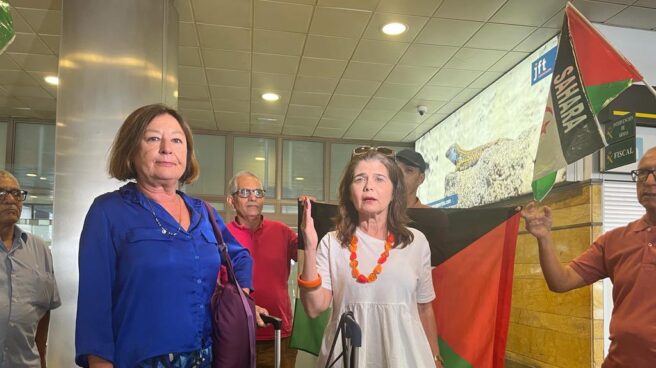

Spanish lawyers Ines Miranda and Lola Travieso after being expelled from Western Sahara.
They could not even get off the plane in El Aaiun, the capital of Western Sahara. The Moroccan authorities this Saturday prevented the access to the occupied Sahara of lawyers Ines Miranda and Lola Travieso, members of a delegation accredited General Council of Spanish Lawyers whose task was to check the situation of the Saharan population in the last territory of the African continent in anticipation of decolonization.
“This Saturday, the Moroccan authorities prevented entry into the territory of Western Sahara, to its capital El Aaiun,” both said in a short video message on board the aircraft. “We condemn the occupation and demonstrate our rejection of the mistreatment of us when they did not even let us get off the plane, and we also condemn the treatment suffered by the civilian population of the Sahara,” they added.
For its part, the General Council of Spanish Jurists condemned the expulsion in writing this Saturday at the Spanish Ministry of Foreign Affairs “without any justification for it.” “Spanish jurists have reiterated their support for the work carried out by the aforementioned association of lawyers, which is nothing less than an examination and condemnation of human rights violations in the former Spanish colony, and believes that the Ministry of Foreign Affairs should formulate a written complaint to the Moroccan authorities for that they prevent the access of two Spanish lawyers,” the council said in a statement.
Both lawyers belong to International Bar Association of Western Sahara (IAJUWS, abbreviation in English) and were part of a legal technical delegation whose purpose was to “supervise on the spotthrough direct observation of the situation and observance of human rights of the Sahrawi population in the non-autonomous territory of Western Sahara” with a complete escalation of repression against Sahrawi activists. The delegation has been working since 2002.
The organization says both lawyers were expelled and forced to return to the Canary Islands “after being illegally detained and vexed for several hours at El Aaiun airport.” The UN and the Spanish Ministries of Foreign Affairs, Interior and Equality, as well as Moncloa and the Prime Minister of the Canary Islands, were briefed about the three-day visit upset by the Alaouite regime.
They also recall that “Western Sahara is on the United Nations list of territories awaiting decolonization and that by law Spain is its administering Power, however, since it renounced the territory in 1975, the obligation not only to decolonize it, but also to report on the situation of its population, as required by Article 73 of the Charter of the United Nations.”
This new entry ban comes into effect just a week after another similar episode, when Sidahmed Hanini, a former Saharawi prisoner, and his wife were expelled after landing in the city and being held at the airport for more than 15 hours. In May, a researcher at the Autonomous University of Barcelona was also expelled after members of the secret police broke into a hotel where he was staying in the occupied territories.
The association, to which Miranda and Travieso belong, emphasizes that this action to prevent the access of international observers is not isolated. “This also applies to the personal envoy of the Secretary-General of the United Nations, Steffan de Mistura, who has been trying for two years to gain access to the territory in order to fulfill the mission assigned to him by the international community to find a solution to the problem. conflict, as well as numerous rapporteurs of the UN Human Rights Council and any non-governmental organizations seeking to clarify the serious crimes committed by Morocco against the people of Western Sahara.”
The Bar Association claims that after the Moroccan occupation in 1976, “numerous cases of persecution, kidnappings, enforced disappearances and summary executions against the civilian population have been recorded and exposed, facts that are being investigated by the Criminal Chamber of the National Court.” “Likewise, with the breaking of the UN-sponsored ceasefire in November 2020 and the resumption of hostilities between the parties, this association has been able to confirm an alarming increase in repression and political persecution against Saharan civilians in areas occupied by Morocco,” they add.
The deteriorating situation leads the group to call on “the international community in general and the Spanish government in particular to demand respect for international law in Western Sahara and the protection of the human rights of the Saharan people.”
Source: El Independiente